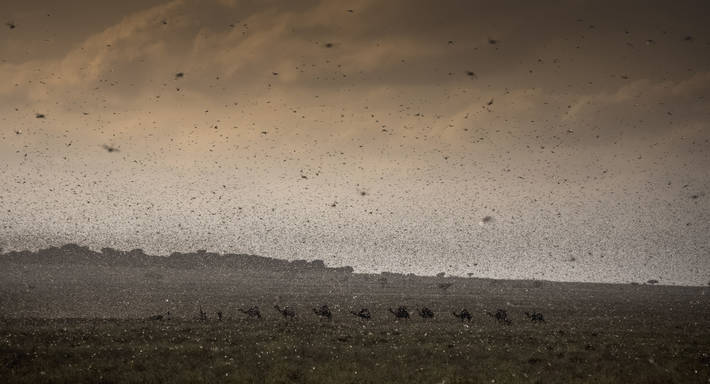
Opening concert of Annual Meeting 2025 in Davos-Klosters to address glacier melt in Antractica
The opening concert of the Annual Meeting 2025 in Davos-Klosters will address the pressing issues ...

The Food and Agriculture Organization (FAO) seeks $70 million to urgently support efforts to combat locust upsurge in Ethiopia, Kenya and Somalia as this poses grave threat to food security.
FAO cautioned that desert Locust swarms in Ethiopia, Kenya and Somalia – already unprecedented in their size and destructive potential – could swell exponentially and spill over into more countries in East Africa if efforts to deal with the voracious pest are not massively scaled up across the region.
“This has become a situation of international dimensions that threatens the food security of the entire subregion. FAO is activating fast-track mechanisms that will allow us to move swiftly to support governments in mounting a collective campaign to deal with this crisis,” said FAO Director-General QU Dongyu.
“Authorities in the region have already jump-started control activities, but in view of the scale and urgency of the threat, additional financial backing from the international donor community is needed so they can access the tools and resources required to get the job done,” Qu said. “FAO stands ready to leverage our expertise and facilitate a coordinated regional response,” he added.
Recent weather in East Africa has created conditions that favor rapid locust reproduction. Left unchecked, the numbers of crop-devouring insects there could grow 500 times by June.
Such swarms – potentially containing hundreds of millions of individual Desert Locusts — can move 150 kilometers a day, devastating rural livelihoods in their relentless drive to eat and reproduce. A Desert Locust devours its own weight in food per day – about two grams.
Swarms continue to pour into Kenya from Ethiopia and Somalia and are rapidly spreading to the center of the country.
In Ethiopia, the insects are moving steadily south towards the Rift Valley, the country’s breadbasket.
Ethiopia and Somalia have not seen Desert Locust swarms of this scale in 25 years, while Kenya has not faced a locust threat of this magnitude in 70 years.
South Sudan and Uganda are not currently affected, but are at risk.
The opening concert of the Annual Meeting 2025 in Davos-Klosters will address the pressing issues ...
Juhayna Food Industries proudly announced that its agricultural arm, El Enmaa for Agricultural Development, has ...
The United Nations Environment Program (UNEP) and several partners launched a pilot project to build ...


اترك تعليقا